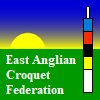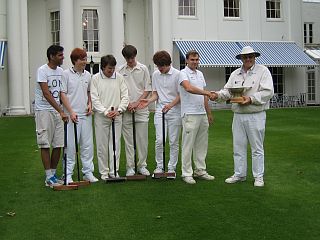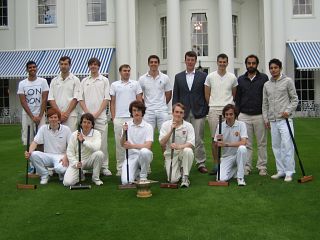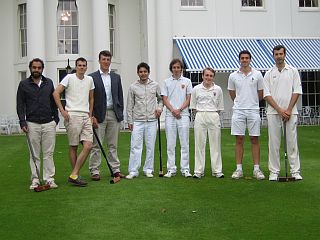

This year the Cambridge team, or at least most of them, arrived bright and early at Hurlingham on an overcast but dry morning of Monday 16th June in anticipation of their latest attempt at overthrowing the Oxford team, which has been dominating the victories in all their recent encounters. The new Cambridge tactics: if you can't beat them, poach! Cambridge had managed to lure both of the previous two year's Oxford captains over to Cambridge for postgraduate studies. It was fitting revenge, too, for Oxford having poached a former Cambridge captain last year. One of the newly poached, Will Gee, is ranked in the world top 100 for Association Croquet and was a real threat to the current Oxford captain, Harry Fisher, who had also risen rapidly into the world top 100 last summer. Oxford confessed that this was the first time in recent years they were not entirely confident of victory. A real contest was in prospect.
Oxford arrived a little late, and play was agreed for a 10:30 start in the usual 6-a-side format of morning doubles and afternoon singles, with the last two of the 8-strong Cambridge squad arriving breathlessly right on the half hour. The first problem: shoes. One of the Cambridge late arrivals was wearing ordinary town shoes with heels, definitely a no-no on the immaculate Hurlingham turf. So with those shoes banned he started play in bare socks, but it was not long before the groundsmen politely scotched that plan too, so after a bit of hunting around a spare pair of flat-soled shoes was procured from somewhere and play continued without further ado.
On the top court Will Gee (-1) and partner James Brind were up against Oxford's Harry Fisher (-1) and promising newcomer Rajiv Gogna, who had only taken up the game 3 weeks earlier but was already down to a 20 handicap. Both Will and Harry evidently intended to hold themselves back while hitting in long-range from time to time and coaxing their partners round as far as possible before embarking on n-tuple peels. But there the tactics diverged somewhat: while Harry kept his ball resolutely for hoop 1 and let his partner make occasional hoops himself, in order to gain enough control to peel his partner through hoops 1, 2 and 3 Will had to make 1 and 2 himself as well. The game progressed accordingly punctuated with some spectacular shooting, though with Will becoming quite concerned that some of his shots were missing by an unusually (for him) large margin, to the point where he suspected his mallet might have been damaged. Given the ferocity of his hitting one should perhaps not be so surprised.
After more than a couple of hours their game had eventually reached the point where Will and James were for 3 and 1b against Oxford's Harry and Rajiv for 1 and 2b. When Cambridge next regained the innings, Will decided it was time to remove his shackles and embark on a highly ambitious delayed sextuple attempt. The 1b and 2b peels were despatched on his way through 3,4,5 and 6, but by this time Will's 1b "pioneer" was SE of peg and the peelee not far off the south boundary SW of 3b. In his attempt to get behind peelee for a rush towards 3b and a death-roll peel going to his 1b "pioneer" he over-hit slightly and went off the lawn. End of break. Some more scrabbling around ensued. Not long after and with his partner James by now on 4b and Oxford on 1 and 3b, and having reached 4b himself with another break, Will attempted an angled 4b peel but without an escape ball. The peel succeeded but striker's ball over-ran and the Cambridge break ended with their balls on 4b and penult, a lead of 11. With the time-limit (and more importantly, lunch) looming and Cambridge also ahead on one of the other two lawns, a 2-1 lunchtime lead for Cambridge looked like a distinct possibility. So it was Harry's turn to let loose on his break. He needed to go round and peg out for a +2 margin after time - no peels required. However, the temptation to indulge in some gratuitous peeling of his own was too much to resist, so after the regular attempt to peel partner through 3b after making 4 failed, he made a second, successful, peel attempt after 5 with a death-roll peel to his pivot, at the expense of leaving the 1b pioneer near 2b instead. Therefore to sustain his break Harry needed a tricky and tense 2-ball interlude through both 6 and 1b before recovering control... which he managed to achieve. With his 4-ball break then back under control there were no more excursions and he pegged out for a +3 margin after time, leaving the other three balls with a horizontal spread. Will missed the final lift shot to leave Oxford the winners.
On the second court Oxford had the better of the play, though progress was fairly slow, and Oxford eventually reached 4 and rover against Cambridge on 3 and 1b for a +6 win on time. Meanwhile there was drama aplenty on the third court too, where the renegade Luke Valori was now playing for Cambridge, partnering Matt Hitchens against Jordan Waters and Fred Woodcock. Oxford took the lead at first, after a while reaching 3 (Fred) and peg against 1 (Luke) and 5. Then Matt made some progress to reach 4b while Fred reached 6, after which Luke then established a solid 4-ball break and appeared to have this under control as he went round too. He had reached 4b himself for a 1-point lead and everything in place to continue to peg, at which point he had a sudden brainstorm and approached 4b from the wrong side! Realising his mistake too late and with the opponents having a lift in prospect, he had no option but to run away into a corner. With Oxford's Fred regaining the innings in time to make 6 before time was called, a sudden death finish ensued. Cambridge shot and missed, but forgetting the easy peg point Oxford then laid up a short rush for 1b instead, and gave Cambridge a second shot... which also missed. Fred duly made 1b for a +1 win on time. So by lunch Cambridge had managed to extract a 0-3 deficit from the jaws of a prospective 2-1 lead.
The afternoon singles brought the interesting prospect of the clash of the two world-ranked titans. Harry went first with a peg-high super-shot. Perhaps over-confident of his shooting prowess, Will put his first ball in the maximum position on the east boundary, at which point Harry immediately put his second ball next to Will's. Will shot and missed, and Harry duly picked up the first break which he took solidly to 4b with a good diagonal spread. Will took the long lift shot with his peg ball and missed into C4, and Harry picked up his second break. With his partner ball and prospective peelee as his pioneer for 2 and the fourth ball still in C4 a standard triple peel was then not an option for Harry, but a delayed triple was still on the cards. However, he ran into the peelee after running 4 instead of getting the return rush on it back to 4b, and the prospect of a triple receded further. Peelee then went north of 4b, so there was no 4b peel before 6 either. The next attempt was an unlikely rush-peel from 1 yard on his way to 1b, but that too rejected, after which Harry abandoned peeling attempts in favour of a safe break to peg. His hoops-5-and-6 leave on Will's balls went a bit astray, however, and the hoop 5 ball was left open to the south boundary. But Will failed to notice that this 10-yarder was his shortest shot and instead took the direct 15-yard shot at Harry's balls on the east boundary, and missed. Harry then made his final 3 hoops and pegged out for a quick +26 win.
The play in the other singles games was to a different standard - and with double-banked games on two of the courts stating at opposite ends, a source of considerable confusion to the spectators as well as, one suspects, to some of the players. Quite some time later the next game to finish was Oxford newcomer Rajiv Gogna, who convincingly outplayed Renard Mansour with some accurate shooting and hoop-running to win +19 and bring Oxford their 5th win to clinch the match. He was followed not long after by Martin Lester who beat Cambridge captain Cesar Miranda by an equally convincing +21.
Meanwhile in his evenly-matched game against Jordan Waters, Luke Valori started in dramatic style by inadvertently peeling one of Jordan's balls through both hoops 1 and 2. The first peel was understandable given that he was taking croquet from an opposition ball stuck in the jaws of 1, but his subsequent forward rush peel of opponent though 2 as well was sheer theatre. To add insult to injury the rushed ball stopped 6 inches behind 2 so he then had to peel it backwards though 2 again in order to make 2 himself, and then make the following roquet backwards though the hoop too. Play then continued for a while and reached the point where Luke was for 2b and 4b, and Jordan was for 4b with a 4-ball break for his backward ball. Having run 1b he put Luke's 2b ball on the west boundary near 2, his own 4b ball as 3b pioneer, misjudged the approach to 2b off Luke's 4b ball and failed the hoop. Distracted by the prospect of a short roquet at 2b, Luke then forgot that he would have had an even shorter roquet and a laid 4-ball break by lifting his 2b ball. Fortunately he was spared the consequences of this lapse when he managed to pick up a break a while later and scrape home to a +5 win on time.
The remaining two games also both went to time, with Oxford's Fred Woodcock gaining a +10 lead unfazed by opponent Matt Hitchens's multi-coloured socks, and with Cambridge's Douglas Buisson managing to claw himself into a +2 lead over James Flannery to bring home Cambridge's second win of the day. Final result: 7-2 to Oxford, in a match that looked for a while as though it could have been a lot closer for a change. Cambridge will no doubt draw continued hope for next year from the prospect of hanging onto their strongest players for a while longer yet.
All involved were grateful to the Hurlingham Club and its members for their generous provision of superb lawns and an excellent lunch, and to the perennial match referee Richard Hilditch. Their continued support for this annual varsity match is greatly appreciated.
 The Oxford team and referee |
 The players |
 The Cambridge team |
|---|
|
Photo gallery |
Scores (Oxford names first, with handicaps where known) | |
|
See also:
Oxford University Association Croquet Club
Cambridge University Association Croquet Club